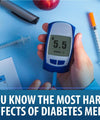How to Overcome Depression and Stay Strong
Recent Post
Weight gain without overeating: is
Feb 15, 2023
Neem For Diabetes: 6 Researched
Nov 03, 2022
Do you know the most
Nov 02, 2022
Start Eating These 7 Fruits
Oct 28, 2022

prakash singh
Wellness Strategist
Mar 14, 2022
Did you know that more than 16 million adults are affected by major depression every year? According to the Anxiety and Depression Association of America, that’s about 6.7% of the adult population in the US. India is not far behind either
This mood disorder is worse than sadness or feeling blue, so you can’t just “snap out” of it. It affects how you think, feel, behave, and can lead to many physical and emotional problems. Luckily, it’s treatable, so knowing how to overcome depression can save your life.
Still, not many people understand what depression really is or how serious it can be. So here’s everything you need to know about this medical illness and, most importantly, how to fight it and stay strong.
What Is Depression?
It is a mood disorder that causes loss of interest, low motivation, and a persistent feeling of sadness. Depression or major depressive disorder affects every part of your being, how you act, how you think, and how you feel. Sometimes it can even lead to different emotional and physical problems.
This condition interferes with your everyday activities and may even make you feel like life is not worth living. It’s pretty common, influencing millions of people’s personal and professional lives.

Depression can even aggravate existing conditions such as diabetes, asthma, arthritis, cancer, cardiovascular disease, and obesity, says Healthline.
That’s why it’s crucial to know how to make a difference between sadness and depression so that you can do something about it.
Difference between Depression and Sadness/Grief
Ending a relationship, loss of a job, or the death of a loved one are all difficult experiences you can endure. They can make you feel sad, and that’s completely normal. In fact, the death of a loved one often makes people feel “depressed.”
However, being sad is different than being depressed, Psychiatry explains. The grieving process is similar to depression, both conditions involving withdrawal from daily activities and intense sadness, but they are still different.
Here are the differences between grief or sadness and depression:
- When you are grieving, you have painful feelings in waves, usually combined with positive memories of the person you’ve lost. When you’re depressed, however, your mood and interest are declined for over two weeks.
- When you’re grieving, you still have your self-esteem, unlike when you’re depressed. Depression causes feelings of self-loathing and worthlessness.
- Sometimes losing a loved one, being a victim of a major disaster or physical assault, or losing a job can cause depression. When depression and grief coexist, the grief lasts longer and is more severe than grief without depression.
Even though there’s some overlap between these two conditions, they are still different. Knowing how to make a difference between the two of them can help you get the help, treatment, and support you need.
Causes of Depression

The most common causes of depression are the following:
- Early childhood trauma—events from your early childhood may affect how your body reacts to stressful situations and fear.
- Family history—having a family history of this mood disorder increases the risk for developing it.
- Medical conditions—such as insomnia, chronic illness, ADHD, diabetes, or chronic pain.
- Brain structure—when the frontal lobe of the brain is less active, it raises the risk of depression.
- Drug use—a history of alcohol or drug misuse
Here are some other common risk factors for depression:
- Stressful events such as a divorce, financial problems, or loss of a loved one
- Personal history of mental illness
- Being self-critical or having low self-esteem
- Certain medications such as beta-blockers, corticosteroids, and interferon
- Lack of successful coping techniques
- A head injury
Signs of Depression
Knowing the symptoms can help you recognize the condition and ask for help or support, which will help you understand how to overcome depression most easily.
Here are the signs of depression that may occur every day, according to Mayo Clinic:
- Angry outbursts, frustration, or irritability even over small insignificant things
- Feelings of sadness, emptiness, tearfulness, or hopelessness
- Sleep problems, such as insomnia (sleeping too little) or sleeping too much
- Loss of pleasure or interest in hobbies, sex, sport, and other normal activities
- Anxiety, restlessness, or agitation
- Lack of energy and tiredness, so even small activities may look too demanding
- Trouble concentrating, thinking, remembering things, and making decisions
- Feelings of guilt or worthlessness, self-blaming
- Slowed body movements, speaking, or thinking
- Headaches, back pain, and other unexplained physical problems
- Suicidal thoughts, recurrent thoughts of death, or suicide
Signs of Depression in Children and Teens
Children and teens may have slightly different symptoms of depression than adults, such as the following:
- Clinginess, irritability, sadness, aches and pains, worry, being underweight, or refusing to go to school in younger children.
- Feeling worthless or negative, irritability, anger, sadness, feeling extremely sensitive, feeling misunderstood, poor attendance or performance at school, sleeping or eating too much, using recreational drugs or alcohol, avoidance of social interaction, loss of interest in everyday activities, or self-harm in teenagers.
Signs of Depression in Older Adults
Aging shouldn’t cause depression, so if you notice an older adult having the following symptoms, make sure they accept it and seek help.
- Personality changes or memory difficulties
- Loss of appetite, fatigue, loss of interest in sex (not caused by medication or a health condition), sleep problems
- Physical aches and pain
- Avoiding social interactions and staying home
- Suicidal feelings or thoughts, especially in men
Types of Depression
According to Medical News Today, some of the most common forms of depression include:
- Major depression—characterized by a constant feeling of sadness and loss of interest in hobbies and other activities that the person used to enjoy. This form of depression is usually treated with psychotherapy and medications.
- Dysthymia, or persistent depressive disorder—characterized by mild or major symptoms of depression that last for at least two years.
- Bipolar disorder—one of the most common symptoms of bipolar disorder is depression, which makes it hard to distinguish both conditions.
- Psychotic depression—characterized by psychosis involving a detachment from reality, false beliefs, and even hallucinations.
- Postpartum depression—occurring in women right after giving birth due to hormonal changes, which can last for months and even years. This is a serious form of depression and should be treated appropriately.
- Seasonal affective disorder or major depression with seasonal pattern—associated with the reduction in daylight during winter and fall, commonly treated with light therapy.
How to Overcome Depression
Living with this serious mood disorder can be difficult, but treating it in the right way can help you fight it, improve your life quality, and eventually overcome it.
Usually, the treatment of depression involves a combination of treatments, medication, and lifestyle therapies suggested by a health-care professional after conducting a thorough diagnostic evaluation.
Medication
Brain chemistry can affect your depression and treatment, so antidepressants are prescribed to help modify it. They are not tranquilizers, uppers, sedatives, or habit-forming. The first effects are noticed within the first two weeks of use, but to experience full benefits, you need to take them for several weeks.
People with depression may have to take antidepressants and other medication for depression for six months and even longer to cut the risk of future episodes of depression.
The most common antidepressants include:
- SSRIs, or selective serotonin reuptake inhibitors
- MAOIs, or monoamine oxidase inhibitors
- Atypical antidepressants
- Tricyclic antidepressants
- SNRIs, or serotonin and norepinephrine reuptake inhibitors
You should only take these medications if your doctor prescribes them, and as prescribed by them. Few herbs like ashwagandha, Ginkgo Biloba, Brahmi etc are also great for calming down.
Talk Therapy, or Psychotherapy
Psychotherapy is most commonly used for treating mild depression. It can also be combined with antidepressants to treat mild to severe forms of depression.
CBT, or cognitive behavioral therapy, is an effective form of therapy that focuses on problem solving and the present. It helps you become aware of any distorted thinking and change your thinking or behavior.
Treatment with psychotherapy can last for a few weeks or longer. It can even involve families or partners, and even other patients in group therapies.
ECT, or Electroconvulsive Therapy
This type of treatment is recommended for people with bipolar disorder or severe major depression who haven’t responded to other treatments. The patient is under anesthesia during a brief electrical stimulation of their brain.
Natural Treatments
Along with medication and therapy, you can also try some natural depression treatments—such as lifestyle changes, diet changes, and even changing your way of thinking to help you feel better.
So here’s how to overcome depression naturally, according to WebMD:
Exercise—it stimulates the secretion of the feel-good hormones called endorphins. You can try different types of exercise, such as walking a few times per week or cycling, and see what works best for you. There are easy to do exercises that releases endorphins.
Yoga for depression—Harvard Mental Health Letter says that yoga can help with anxiety and depression and reduce the effects of stress. For example, if you are having sleeping problems because of your depression, try the corpse pose where you relax on your back.
Set goals—make sure you set a realistic daily goal to accomplish to help you feel better. You can start with a small goal, such as doing the dishes, and continue with more challenging goals.
Get in a routine—having a daily routine will help you get back on track, as depression often strips away the structure from people’s lives.
Eat healthy—pay attention to your eating habits, as depression can make you develop unhealthy habits such as overeating. So get in control of your eating and add more omega-3-rich foods in your diet (such as tuna and salmon) and foods high in folic acid (such as avocado and spinach). Berries like açai berry, blue berries are good for mental health as they have surge of antioxidants
Get enough sleep—lack of sleep can worsen your depression, so make the necessary lifestyle changes to ensure you go to bed at the same time every day. The same applies to getting up in the morning. Try to avoid napping and sitting on your mobile phone, laptop, or TV before bedtime.
Take on responsibilities—depression often makes people give up their responsibilities at work and at home. However, having responsibilities every day and staying involved can help you fight depression and give you a sense of accomplishment.
Question negative thoughts—the fight against depression happens mostly in your brain and the way you think. This condition makes you come into the worst possible conclusions, but try using logic to challenge these thoughts. If you feel worthless, ask yourself if that’s really true. This can take time and effort, but it’s really important in your fight against depression.
Use supplements—SAMe, folic acid, and fish oil are said to help relieve depression symptoms. However, always consult your doctor before starting any of them, especially if you’re already on medications.
Try some natural remedies—such as ginseng, St. John’s Wort, lavender, or chamomile, but make sure you consult a doctor before taking any natural remedy.
Try to have fun—you may feel like there’s nothing fun you can do, but that’s just one of the depression symptoms. Keep on trying to make time for activities you enjoy.
Do something new—depression makes you feel trapped in a mundane pattern of life, so try to do something new. That could be going to a cinema, reading an old book on a park bench, or taking an art class. When you challenge yourself to do something new, you help increase the dopamine levels in your brain, which is linked to learning, enjoyment, and pleasure.
Reward your efforts—whenever you achieve a goal, no matter how small or insignificant it may seem, celebrate it in your own way. That could be enjoying a piece of cake or a nice, warm bath.
Spend time with nature—nature has a huge impact on depression, especially sunlight. So make sure you spend at least 15 minutes every day outside, whether that’s in the local park or your yard.
Conclusion
Depression is a common but serious condition that requires a proper treatment and certain lifestyle changes. Knowing how to overcome depression may save your life, so take these tips into consideration if you or anyone you know is dealing with this serious mental condition. Stay strong!
← Older Post Newer Post →
© 2022, WellthyLife. All Rights Reserved.








